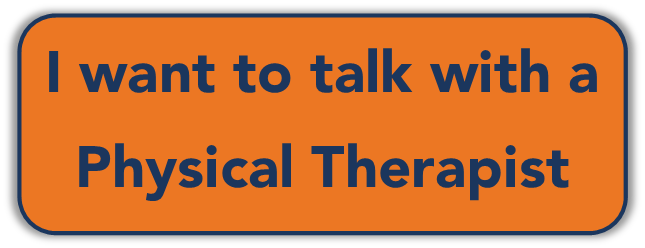Today I did three evaluations, three very different evaluations. I evaluated an older man who has been active until the last year, but now has concerns about falling. I evaluated a young athlete recovering from knee surgery. And I evaluated a new mother who has been a runner her whole adult life, but now she can’t exercise without peeing herself. All physical therapy patients all unsure of exactly what to expect at physical therapy.
It is not that surprising that they were unsure of what happens during physical therapy because each person, each body, and each case are unique. If my older patient fell and ended up with a broken hip, his physical therapy would look quite a bit different than the balance rehabilitation program we developed. If my young athlete had been hit in the head instead of the leg, his concussion recovery program would look very different than his orthopedic rehabilitation program looks. Even my young mother would be doing slightly different exercises and modalities if she had come to me with the low back pain she had throughout her pregnancy (it might have even stopped the bladder leaks from starting, low back pain is highly correlated with pelvic floor dysfunction).
But beyond just knowing what to expect at physical therapy, these patients all know that their expectations of physical therapy will change slightly as their care progresses, as their pain decreases, as they become stronger, and as they become more competent. There are 5 phases of physical therapy and while each of my patients today learned what to expect during physical therapy, they only experienced what happens during a physical therapy examination.
You just need to get started with an evaluation, today!

What Happens During a Physical Therapy Evaluation?
Your physical therapy evaluation is likely to be the most time-consuming appointment of your physical therapy plan of care. There is a very specific reason for that: you are unique, your problem is unique and your physical therapist is going to need to understand you and how your problem is affecting your quality of life. This means that you can expect to be asked several questions during your physical therapy evaluation.
If you were referred to physical therapy by your doctor, you might be asking why your physical therapist is asking all the same questions. One reason is that for insurance to pay for your care, we have to ask these questions, but that is the regulatory reason. The real reason that your PT and your physician ask you similar questions is that they both want you to Love Your Life, but they are looking for different things. Your physician knows about body mechanics, but she is not going to spend the time optimizing your movement in function. Nor is your PT going to need to know the in-depth causes of your diabetes, just that you sometimes have pain in your feet which makes walking more difficult. Your PT and your doctor may be asking the same questions but they will be paying attention to different information in your response to best optimize your outcomes.
Isn’t it time you called your Oklahoma City Physical Therapists to see what FYZICAL can do for you? CALL FYZICAL
Questions are not the only thing you can expect during your physical therapy evaluation, you can also expect to be asked to move and to have your physical therapist touch you. There are two things your physical therapist may be doing in this case. First, they may be taking a subjective assessment of your current functioning level. For example, if you cannot stand on your injured leg or laugh without peeing yourself, there is not necessarily an objective test that is going to tell your physical therapist what to work on. But your physical therapist will likely also complete some objective measures of your current wellness. These might include a measurement of the shoulder angle at which you can raise your arm without pain, or your ability to remain upright and without falls when you are on an unstable surface.
The last couple of things you can expect your PT to do during your evaluation relate to starting your course of treatment. Your PT will likely use a modality or some manual therapy to help relieve some of your pain and get you moving better. They may send you home with some exercises, but it will depend on how able you are to do your exercises independently. Sometimes patients complain that PT just exercises or that physical therapy hurts. In those cases I almost always find the same issue, the patient was doing the exercises incorrectly.
Want to know how to Prepare for Your First Physical Therapy Session?
What Happens During a Physical Therapy Session?
During a typical physical therapy session, you can expect a few different things to happen, and while they may look the same throughout your plan of care, the reason you are doing the activity may change slightly over time.
If you are in pain, you can expect that ice or heat may be applied to help reduce inflammation or improve circulation to your impacted body part. We know you can ice and heat at home, but the immediate time spent doing it while you are in your physical therapy session can help maximize your time and outcomes while receiving treatment (but if your PT is having you lay on a table for an extended period with just ice or heat, it might be time to look for a more attentive PT). Ice and heat are two of a variety of modalities your physical therapist may use to help you get the most out of your manual therapy and therapeutic exercises. They are not meant to be therapy as a stand-alone, but to help augment everything else you are doing during physical therapy.
When it comes to the rest of your time during therapy, you are likely to be doing some exercises and some manual therapy, if appropriate. One reason for regularly returning to your physical therapist is that he will not be finished with assessing after your first session. Your physical therapist is going to regularly assess your progress so that he can make sure to progress you without pain, but also quick enough that physical therapy is working for your unique situation. Your exercises may look like something you could do on your own, but remember that most of my patients who end up thinking PT is easy are the ones who were not doing the exercises correctly and did not respond to feedback, or tried to do more than was assigned and ended up hurting themselves or fatiguing themselves such that they could have injured the tissue more.
What Happens in Your Last Physical Therapy Visit?
You know when physical therapy is over when you have maximized your current potential. For some people that may not be as far as they would like. Maybe they hit a plateau and insurance will not pay anymore, or maybe there was a life-altering injury. This can be tough, but your physical therapist wants you to live your best life given your current circumstances.
You can expect your last physical therapy visit to be similar to the previous session or two, but your PT will emphasize you're being able to correctly implement your current exercises and any new exercises he is going to discharge you with. It should be a celebration of the progress you have made and will likely include repeating some of the initial measures you did during your evaluation. This helps your physical therapist make an informed decision about your progress.
Physical therapy at its best will be such a seamless process from start to end that your progress may not be noticeable to you. The addition of repetitions, the increased duration of repetitions, and the addition of new exercises will come so efficiently from your PT that you may not even realize what happened during your physical therapy plan of care until you are out of pain and have returned to doing the things you love. Physical therapy isn’t perfect, it cannot solve all issues, and sometimes surgery or another plan is necessary, but most of my patients whose physical therapy “fails” want to move too quickly or in a direction that isn’t the next step. You have to walk before you run, but you cannot walk if you cannot stand. Your Physical Therapist knows how to take from beginning to end in your physical therapy journey.
How Does Physical Therapy End?
In reality, however, your physical therapy should never really end. If you have worked collaboratively with your physical therapist throughout your plan of care then you should expect that physical therapy will be an ongoing part of your home and health routine. It will be something you can do independent of coming in to see your physical therapist, but you always have your physical therapist available to help support you if your functioning isn’t as optimized as you would like.
Learn more about how long you should attend physical therapy here.
What Happens after Physical Therapy?
After physical therapy is over you can expect to return to your life without limitation and pain. That doesn’t mean you are Superman, but it should mean that you can engage in your daily activities without challenge. Physical Therapy works, but it is an ongoing process. Just like going for a run once or eating a salad once is not going to get you into better shape, physical therapy done once is not sufficient. You need to keep up a routine of therapy, but after your formal physical therapy is completed you will be able to maintain your gains at home. And if something changes or you need a new problem cared for, your physical therapist will be available when you need them.
-FYZICAL Therapy & Balance Centers of Oklahoma City
FYZICAL Therapy & Balance Centers of Oklahoma City provides orthopedic physical therapy in Lakeside, The Village, Nichols Hills, and surrounding NW Oklahoma City. Our physical therapists are specially trained to treat all types of pain, movement disorders, and musculoskeletal dysfunction including post-surgical recovery from ACL Tear. Our practitioners take a patient-centered individualized approach that focuses on your health needs. If you are unsure about your pain, or you want to see the FYZICAL Difference for yourself, schedule a free consultation today.


